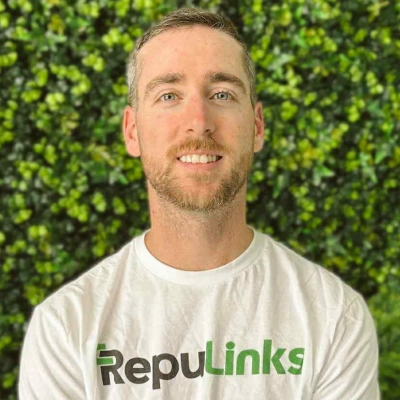9 Ways to Adapt Your Link-Building Strategy to Industry Changes
Link-building strategies must evolve with changing industry trends, and this article presents nine proven approaches backed by expert insights. Search professionals can learn how to prioritize quality over quantity and develop authentic relationships within their niche. These actionable strategies help marketers adapt their link-building efforts while maintaining focus on sustainable, value-driven results.
Blend PR Background with SEO Strategy
When search algorithms began putting more value on brand credibility and online authority, I started blending my PR background with SEO strategy. Instead of viewing link-building as a checklist or technical exercise, I approached it the same way I would approach media outreach. The goal became creating stories that publishers wanted to feature and audiences wanted to read.
This change also affected how I measured success. I stopped focusing only on the number of backlinks and started paying attention to the quality of the mentions, the engagement they brought, and the overall trust they helped build. A single placement in a respected publication often carried more long-term value than a dozen low-quality links.
Bringing PR and SEO together has made my approach more natural and sustainable. It allows me to focus on relationships, storytelling, and credibility, which tend to hold up no matter how algorithms evolve. That shift has helped keep the work meaningful, both for clients and for the audiences they want to reach.

Quality Over Quantity for Healthcare Clients
Google's YMYL update made our old strategy of just piling up backlinks useless for healthcare clients. We had to change. Instead of chasing numbers, we started earning links from actual medical schools and clinician networks. Our rankings climbed back up almost immediately. My takeaway now is that whenever Google gets serious about credibility, focusing on quality is the only move that actually works.
Local Expertise Through News Site Columns
Google's E-E-A-T update made our old link-building tactics stop working for local clients. I tried something new, getting our clients to write columns for local news sites. This made them look like actual experts beyond their own websites. I've found that consistently sharing useful information builds a much stronger reputation than just chasing links. These days, I tell people to care about topical relevance as much as they care about backlinks.

Value-Driven Partnerships Replace Quantitative Approach
Yes. I've had to adjust my link-building strategy several times due to Google's algorithm updates. One major shift happened during the 2023 Helpful Content Update.
Many sites with our backlinks saw a sudden drop in visibility. The reason was that they were considered "thin" or "AI-heavy" in content quality. This forced us to rethink our approach and focus more on genuine, value-driven collaborations instead of quantitative link building.
Earlier, our strategy relied on guest posts and niche edits on sites with decent metrics. But after the update, it became clear that Google cared more about context and relevance than just domain authority. So, we started working on fewer but stronger partnerships. We reached out to websites with real audiences, active blogs, and authentic engagement. We also made sure the content we contributed added real insight, not just backlinks.
We began blending link-building with digital PR. It included publishing expert quotes, interviews, and insights on trusted industry sites. These links turned out to be more stable and impactful. It wasn't easy at first because it required more time and coordination. However, the results were far better. Our referral traffic improved, and rankings became more consistent, even with later updates.
I also learned the value of content freshness. We focused more on updating existing resources and creating new, relevant articles that others would naturally want to reference.
That experience taught me that link-building can't stay static. What worked last year might not work now. The key is to stay curious, analyze what's changing in search intent and content trends, and build relationships that go beyond links.
Remember, your SEO naturally becomes more future-proof when your goal shifts from "getting backlinks" to "adding value."

Focus on Topic-Specific Links and Resources
When Google launched its Helpful Content and Link Spam Updates, I had to make a huge change to how we built links, not just for ourselves but also for our clients. It became clear that general backlinks were no longer valuable. In some cases, they even harmed rankings. Google started to emphasize topical relevance and link context rather than just authority metrics.
I decided to stop generic outreach and focus solely on links related to specific topics, especially from sites that are directly connected to our niche. For example, instead of going after broad business blogs, I built relationships with publishers in web design, marketing, and SEO.
Additionally, I started creating data-driven articles and resources that naturally attracted links from relevant industry sites - even some of my competitors! This change not only improved our link profile but also opened the door to relationships with industry leaders and colleagues. As a result, our rankings significantly increased - while others fell flat, we were crushing it!

Build Genuine Local and Geographic Connections
At Local SEO Boost, the most significant change occurred following the Google 2023 Link Spam Update, which undermined large-scale guest postings and poor quality directory links. The loss of ranking occurred to many businesses overnight not due to the weakness of their content but due to the lack of depth in their backlinks. We changed our approach to be volume based to validation and forming alliances with local chambers of commerce, community organizations and niche industry publications that were based on real-life links. Each of the links was connected to a verifiable and geographically or professionally relevant entity. Another technique we initiated was the inclusion of brand mention in local event pages and press releases which conformed to structured data markup which has enhanced trust signals. In the fourth month, domain authority became stable and local map visibility increased in several areas of the service. The point was made very plainly- genuine, geographically based backlinks are more weight than thousands of generic mentions ever had.

Develop Real Relationships with Industry Experts
That Google update forced us to change our approach. We stopped the old link outreach and started building real relationships with actual experts in our field. Everyone on the team agrees this worked way better for building our credibility. We also started using AI to match our research with the right publishers, which sped things up and got us better results.

Create AI-Friendly Content for Citation Opportunities
In November of last year we realised Answer Engine Optimisation and generative Engine Optimisation were becoming a thing and that it would start influencing how people discover content, we realised traditional backlinks alone weren't enough. Algorithms like Claude, ChatGPT, and Perplexity were pulling mentions and entities rather than just blue links.
So we pivoted our link building strategy from guest posts to Answer Engine Optimisation (AEO) and Generative Engine Optimisation (GEO). In addition to our traditional backlink strategies we began creating structured content that AI could quote directly. We built blogs, FAQs, and LinkedIn posts designed to answer questions in natural language and included schema to help AI engines recognise and cite us. I think that single shift expanded our reach beyond Google now we're cited inside AI generated answers too. We've helped clients todo the same. As always a balanced approach is key and so it's important to try all methods.

Invest in Operational Excellence for Authority Links
My business doesn't deal with "link-building strategy" or abstract algorithm updates. We deal with heavy duty trucks parts, where the "algorithm change" is the shifting landscape of verifiable trust. We had to adapt our strategy when digital search results started prioritizing verifiable operational signals over simple web links.
We adjusted by fundamentally abandoning the pursuit of high-volume, low-quality external links. Our pivot was to The Authority-Link Protocol. We focused entirely on earning a link from one critical source: the OEM Cummins technical documentation repository or certified dealer networks. This meant the link was earned not through marketing, but through absolute, non-negotiable operational compliance.
The strategy worked because we shifted our marketing budget into operational excellence. We invested in the technology and personnel needed to provide flawless expert fitment support and certified documentation, which made our website one of the few technically reliable sources for specific Turbocharger schematics. This forced the legitimate trade authorities to link to us because our content was essential for their customers' operational success. The ultimate lesson is: You secure the most valuable links by ensuring your core business integrity is irrefutable.



